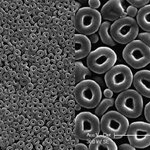
Just like humans, liver cells love doughnuts, but these are polystyrene ring “doughnuts”, just a few microns across, and they might give scientists a new way to deliver drugs selectively, potentially eliminating nasty side effects of life-saving treatments such as chemotherapy, according to chemists writing in Chemical Communications.
Mark Bradley and colleagues at the University of Edinburgh, UK, serendipitously made the polymer doughnuts while studying potential drug-carrying microparticles.
While synthesising micro-spheres, the team added a small amount of dioxane to their usual ethanol…
